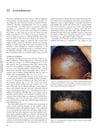 November 2023 in “International Journal of Trichology”
November 2023 in “International Journal of Trichology” Trichoscopic features help diagnose and assess female pattern hair loss severity, with inflammation playing a key role.
 July 2023 in “Frontiers in Veterinary Science”
July 2023 in “Frontiers in Veterinary Science” Melatonin helps hair grow by activating the RORα receptor in goats.
 December 2022 in “Frontiers in Pharmacology”
December 2022 in “Frontiers in Pharmacology” Tianma Gouteng decoction may help prevent hair loss and promote hair growth.

A man wrongly believed he had parasites, showing that delusional infestation can affect men and is often linked with other psychiatric issues, but can be treated with antipsychotics.
 May 2022 in “Pharmacognosy journal”
May 2022 in “Pharmacognosy journal” Moringa seed oil may help prevent hair loss and promote hair growth.
 May 2022 in “Journal of the Egyptian Women's Dermatologic Society (Print)”
May 2022 in “Journal of the Egyptian Women's Dermatologic Society (Print)” Women's hair loss can be due to hormonal changes and various conditions, with treatments focusing on stopping progression and managing symptoms.
 August 2021 in “International Journal of Research in Dermatology”
August 2021 in “International Journal of Research in Dermatology” The most common scalp problems in Sikkim were seborrheic dermatitis, androgenetic alopecia, and alopecia areata.

Platelet-rich plasma is a promising and cost-effective treatment for hair and skin issues in older adults in India.
 January 2019 in “Kocaeli tıp dergisi”
January 2019 in “Kocaeli tıp dergisi” People with chronic hair loss may have a higher chance of Vitamin B12 deficiency.
 August 2018 in “Journal of The American Academy of Dermatology”
August 2018 in “Journal of The American Academy of Dermatology” Finasteride, a hair loss drug, is linked to increased suicidal thoughts, particularly when used for hair loss.
 August 2018 in “Journal of The American Academy of Dermatology”
August 2018 in “Journal of The American Academy of Dermatology” Finasteride use for hair loss is linked to an increased risk of suicidal thoughts and a higher risk of suicide.
 August 2018 in “Journal of The American Academy of Dermatology”
August 2018 in “Journal of The American Academy of Dermatology” The conclusion is that finasteride is linked to an increased risk of suicidal thoughts and a higher risk of completed suicide when used for hair loss.
 June 2018 in “Disease-a-Month”
June 2018 in “Disease-a-Month” Remove inflamed cysts surgically, avoid topical antibiotics on wounds, treat skin and mouth conditions with specific medications, and address underlying causes of hair loss.
 January 2017 in “Journal of Investigative Dermatology Symposium Proceedings”
January 2017 in “Journal of Investigative Dermatology Symposium Proceedings” The 2015 Hair Research Congress concluded that stem cells, maraviroc, and simvastatin could potentially treat Alopecia Areata, topical minoxidil, finasteride, and steroids could treat Frontal Fibrosing Alopecia, and PTGDR2 antagonists could also treat alopecia. They also found that low-level light therapy could help with hair loss, a robotic device could assist in hair extraction, and nutrition could aid hair growth. They suggested that Alopecia Areata is an inflammatory disorder, not a single disease, indicating a need for personalized treatments.
 July 2012 in “Springer eBooks”
July 2012 in “Springer eBooks” The document concludes that proper diagnosis and treatment of nonscarring alopecias can improve quality of life and hair regrowth is possible as the hair follicle remains intact.
 June 2012 in “Expert Review of Dermatology”
June 2012 in “Expert Review of Dermatology” Japanese researchers created new hair follicles from human cells that grew hair when put into mice, and other findings showed a link between eye disease severity and corneal thickness, gene mutations affecting hearing and touch, and the safety of the shingles vaccine for adults over 50.
 April 2012 in “Informa Healthcare eBooks”
April 2012 in “Informa Healthcare eBooks” Trichotillomania is a disorder where people compulsively pull out their hair, treated with drugs and behavior therapy.
 February 2012 in “Clinical and Experimental Dermatology”
February 2012 in “Clinical and Experimental Dermatology” Many adult women experience unexplained excessive hair shedding, often starting before age 40.
 January 2012 in “Journal of the American Academy of Dermatology”
January 2012 in “Journal of the American Academy of Dermatology” 2011 dermatology discussions highlighted stem cell hair treatments, new lichen planopilaris therapies, skin side effects from cancer drugs, emerging allergens, and the link between food allergies and skin issues.
 May 2009 in “Endocrinologist”
May 2009 in “Endocrinologist” Women with thyroid disease are more likely to experience female pattern hair loss, especially if they've had thyroid disease for a long time.
 January 2009 in “Hair transplant forum international”
January 2009 in “Hair transplant forum international” Realistic expectations about hair density and coverage lead to higher patient satisfaction in hair transplant surgery.
 June 2008 in “British Journal of Dermatology”
June 2008 in “British Journal of Dermatology” Herpes gestationis is linked to certain antigens, atopic eczema affects T cell populations and may be eased by breastfeeding, higher doses of anti-androgen treatment can improve androgenic alopecia, topical minoxidil increases hair thickness, long-term methotrexate therapy can cause liver fibrosis in psoriasis patients, and Lichen Sclerosus et Atrophicus patients aren't at higher risk for autoimmune disorders.
 January 2008 in “Elsevier eBooks”
January 2008 in “Elsevier eBooks” More men are getting cosmetic surgery, with nose jobs and hair transplants being popular, and choosing a qualified surgeon is important.
 August 2001 in “Dermatologic Surgery”
August 2001 in “Dermatologic Surgery” The KNU implanter for hair transplants showed a high survival rate of 90%+ for transplanted hairs after 6 months, with benefits like natural hair direction and fewer scars.
 August 2000 in “Australasian Journal of Dermatology”
August 2000 in “Australasian Journal of Dermatology” The document suggests "Occupational Skin Disease" is a useful standard text, finds "The Clinical Management of Itching" poorly organized, recommends "Atlas of Contact Dermatitis" for its illustrations, and values "Handbook of Diseases of the Hair and Scalp" for its information despite flaws.
 December 1999 in “Dermatologic Surgery”
December 1999 in “Dermatologic Surgery” Experts discussed sedation, hair transplant techniques, and called for respectful professional communication.
 September 1998 in “Journal of The European Academy of Dermatology and Venereology”
September 1998 in “Journal of The European Academy of Dermatology and Venereology” Aging affects hair density and skin health, and Behcet's disease, a complex condition with no specific test, involves sores and systemic issues, treated with various medications.
 January 1953 in “The Lancet”
January 1953 in “The Lancet” Cortisone may help hair regrow by altering the local environment, with regrowth starting 3-4 weeks after treatment, but its use is not widely recommended.
March 2024 in “International journal of molecular sciences” Meibomian glands are highly specialized and differ significantly from other sebaceous glands in structure and function.
 January 2024 in “Frontiers for young minds”
January 2024 in “Frontiers for young minds” Alopecia is a condition causing hair loss that can impact looks and mental health.




























